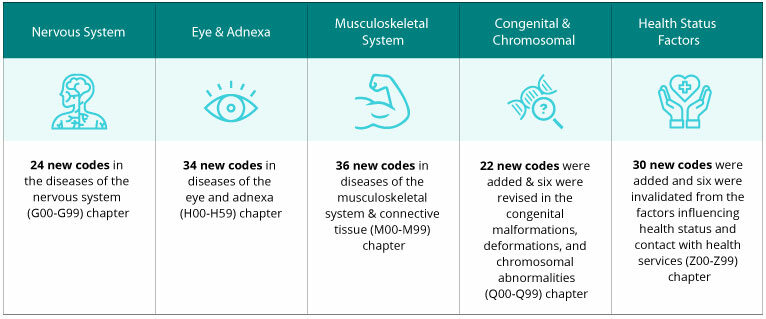
ICD-10 CM 2024: The Latest Changes and Their Impact on Medical Coders
As a vigilant Medical Billing Company, we'd like to stay up-to-date with these bi-annual updates and share them often. Each year new, changed and deleted codes are released and become effective on October 1st for ICD-10-CM/PCS codes. For Fiscal year (FY) 2024, the following changes might help you bill your services with these codes more accurately.
To summarize this year, we may see 395 brand new ICD-10 codes, 25 deletions, and 13 (22) revisions
Certain infectious and parasitic diseases
- New codes under Certain Infectious and Parasitic Diseases; one new code to note: A41.54 Sepsis due to Acinetobacter baumannii.
Diseases of the nervous system
- Five new codes for Parkinson's disease:
- G20.A1, Parkinson's disease without dyskinesia, without mention of fluctuations
- G20.A2, Parkinson's disease without dyskinesia, with fluctuations
- G20.B1, Parkinson's disease with dyskinesia, without mention of fluctuations
- G20.B2, Parkinson's disease with dyskinesia, with fluctuations
- G20.C, Parkinsonism, unspecified
- Under G43 Migraine, there are new subcategories and codes for reporting chronic migraines and differentiating whether the pain is manageable
Diseases of the blood and blood-forming organs and immune disorders
- Under Diseases of Blood, there are several additions and revisions for reporting sickle-cell disorders.
- The ICD 10 code for familial adenomatous polyposis (FAP) is D12.6. A new code has been added to capture benign neoplasms elsewhere in the digestive system.
- D13.9 (Benign neoplasm: Ill-defined sites within the digestive system) is revised to D13.99 for a handful of applicable body areas
- New Z-codes are to report family history of FAP.
- New codes for desmoid tumors (D48.11-).
- New codes for other specified neoplasms of uncertain behavior of connective and other soft tissue (D48.19)
- New codes for reporting Schwachman-Diamond syndrome (D61.02) and IgG4-related disease (D89.84), and many parenthetical revisions
Endocrine, nutritional, and metabolic diseases
- Under Endocrine, Nutritional, and Metabolic Diseases, there are new codes to identify individuals with Autosomal dominant hypocalcemia (ADH), a genetic disorder of calcium metabolism mediated by hypoparathyroidism
- New codes for reporting various lipid storage disorders and for improved reporting of leukodystrophies
- E74.05 is a new code for lysosome-associated membrane protein 2 [LAMP2] deficiency
- New codes E88.810-E88.819 to identify insulin-resistant metabolic syndrome types A and B) and unspecified insulin resistance
Diseases of the circulatory system
- New codes for other hypertension (I1A-) and inappropriate sinus tachycardia (I47.10-I47.19).
Diseases of the respiratory system
- Addition of a new subcategory and new codes to identify bronchiolitis obliterans syndrome.
Diseases of the digestive system
- New codes for acute appendicitis (K35.200-K35.211, K35.219), disorders of the retroperitoneum (K68.2-K68.3), short bowel syndrome (SBS) with or without continuity between the short bowel and colon (K90.821-K90.822, K90.829), and intestinal failure (K90.83).
Diseases of the musculoskeletal system and connective tissue
- New codes under new subcategories M80.0B Age-related osteoporosis with current pathological fracture and M80.8B Other osteoporosis with current pathological fracture, pelvis
Diseases of the genitourinary system
- New codes under N02.B Recurrent and persistent immunoglobulin A nephropathy to indicate the severity or course of IgAN
- New codes are added under categories N04 Nephrotic syndrome and N06 Isolated proteinuria with specified morphological lesion
Pregnancy, childbirth, and the puerperium
New codes O26.64- for the reporting of intrahepatic cholestasis in pregnancy.
External Causes of Morbidity
- New codes in the external causes of morbidity (V00-Y99) chapter to capture accidents and injuries, such as:
- W44.A1XA, Button battery entering into or through a natural orifice, initial encounter
- W44.C0XA, Glass unspecified, entering into or through a natural orifice, initial encounter.
- W44.H2XD, Knife, sword, or dagger entering into or through a natural orifice, subsequent
Changes to ICD-10 Coding Guidelines
Here are some key new guidelines for ICD-10 FY 2024 as listed in a recent AAPC article:
Pregnancy, childbirth, and the puerperium
- Screening for COVID-19: Code Z11.52 should be assigned for COVID-19 screening encounters on or after Oct. 1, 2023.
- The following guideline is added: “For screening for COVID-19, including preoperative testing, assign code Z11.52, Encounter for screening for COVID-19.”
- Myocardial Infarction with Coronary Microvascular Dysfunction: New ICD-10 code I21.B describes myocardial infarction with coronary microvascular disease and myocardial infarction with nonobstructive coronary arteries (MINOCA) with microvascular disease. The FY 2024 ICD-10 guideline states:
- Coronary microvascular dysfunction (CMD) is a condition that impacts the microvasculature by restricting microvascular flow and increasing microvascular resistance. Code I21.B, Myocardial infarction with coronary microvascular dysfunction, is assigned for myocardial infarction with coronary microvascular disease, myocardial infarction with coronary microvascular dysfunction, and myocardial infarction with non-obstructive coronary arteries (MINOCA) with microvascular disease.
- Coma
- Code R40.20, Unspecified coma, should be assigned when the underlying cause of the coma is not known, or the cause is a traumatic brain injury and the coma scale is not documented in the medical record.
- Do not report codes for unspecified coma, individual, or total Glasgow coma scale scores for a patient with a medically induced coma or a sedated patient.
- Coma scale codes (R40.21- to R40.24-) can be used in conjunction with traumatic brain injury codes. These codes cannot be used with code R40.2A, Nontraumatic coma due to underlying condition. They are primarily for use by trauma registries, but they may be used in any setting where this information is collected. The coma scale codes should be sequenced after the diagnosis code(s).”
- Newly added code R40.2A also describes secondary coma. A parenthetical note in the ICD-10-CM code book instructs you to code first the underlying condition.
- Follow-up: The guideline states:” Codes Z08, Encounter for follow-up examination after completed treatment for malignant neoplasm, and Z09, Encounter for follow-up examination after completed treatment for conditions other than malignant neoplasm, may be assigned following any type of completed treatment modality (including both medical and surgical treatments)."
- Reporting Additional Diagnoses: Under Reporting Additional Diagnoses, the words “clinically significant” have been added to the guideline: “For reporting purposes, the definition for ‘other diagnoses’ is interpreted as additional clinically significant conditions that affect patient care in terms of requiring …”
To end this, this is merely a summary of the updates related to diagnosis coding for FY 2024. The medical coding team should continuously monitor and evaluate yearly code modifications and back-track the denials coming from the ill-reporting of these codes.
Medical Billing agencies play an important part in minimizing errors and denials and ensure accurate reporting of patient's conditions and circumstances which in turn lets the payers know how medically necessary the procedure, service or supply was.
To be updated with these modifications is to ensure your practice is on the right track. A cautious provider and their coding teams should take a good look into these codes, especially the ones that directly impact their specialty.
AltuMED is a Medical Billing Services and Solutions Company providing services for more than a decade. Our Medical Billing and Coding experts help Medical Coders and Medical Practices to stay vigilant with the latest coding updates to avoid any inaccuracies. Contact us for more!
Subscribe to Our Newsletter!
Subscribe to Our Newsletter!
Enter Your Email Address. We Promise We Won't Spam You

